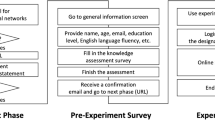Abstract
The design of a conversational virtual agent that plays the role of a lactation educator promoting breastfeeding is described, along with a manipulation to make the agent appear more or less feminist. Results from a randomized pilot study indicate that study participants were aware of the manipulation and participants who were more feminist preferred the feminist agent, while those who were non-feminist preferred the non-feminist agent. This work demonstrates one way that feminism can be incorporated into agent design, and a methodology for identifying users who will be most receptive to it.
Access this chapter
Tax calculation will be finalised at checkout
Purchases are for personal use only
Similar content being viewed by others
References
Nelson, C., Treichler, P.A., Grossberg, L.: Cultural studies: an introduction. In: Cultural Studies, pp. 1–22 (1992)
Lorber, J.: The social construction of gender. In: The Social Construction of Difference and Inequality: Race, Class, Gender, and Sexuality, pp. 99–106 (2003)
Davis, T.L.: Voices of gender role conflict: the social construction of college men’s identity. J. Coll. Stud. Dev. 43, 508–521 (2002)
Lorber, J.: Paradoxes of Gender. Yale University Press, New Haven (1994)
Bardzell, S., Churchill, E., Bardzell, J., Forlizzi, J., Grinter, R., Tatar, D.: Feminism and interaction design. In: Conference Feminism and Interaction Design, pp. 1–4. ACM (2011)
Bardzell, S.: Feminist HCI: taking stock and outlining an agenda for design. In: Proceedings of the SIGCHI Conference on Human Factors in Computing Systems, pp. 1301–1310. ACM (2010)
Hawkins, R.P., Kreuter, M., Resnicow, K., Fishbein, M., Dijkstra, A.: Understanding tailoring in communicating about health. Health Educ. Res. 23, 454–466 (2008)
American Academy of Pediatrics (2005)
Centers for Disease Control and Prevention: Breastfeeding report card - United States, 2014 (2014)
Hausman, B.L.: Mother’s Milk: Breastfeeding Controversies in American Culture. Psychology Press, New York (2003)
Hausman, B.L.: Breastfeeding, rhetoric, and the politics of feminism. J. Women Polit. Policy 34, 330–344 (2013)
Wolf, J.B.: Is Breast Best?: Taking on the Breastfeeding Experts and the New High Stakes of Motherhood. NYU Press, New York (2010)
Bickmore, T., Schulman, D., Shaw, G.: DTask & LiteBody: open source, standards-based tools for building web-deployed embodied conversational agents. In: Proceedings of the Intelligent Virtual Agents, Amsterdam, Netherlands (2009)
Cassell, J., Vilhjálmsson, H., Bickmore, T.: BEAT: the behavior expression animation toolkit. In: Proceedings of the 28th Annual Conference on Computer Graphics and Interactive Techniques, pp. 477–486 (2001)
Bickmore, T., Picard, R.: Establishing and maintaining long-term human-computer relationships. ACM Trans. Comput. Hum. Interact. 12, 293–327 (2005)
Blum, L.M.: At the Breast: Ideologies of Breastfeeding and Motherhood in the Contemporary United States. Beacon Press, Boston (2000)
Baumslag, N., Michels, D.L.: Milk, Money, and Madness: The Culture and Politics of Breastfeeding. Bergin & Garvey, Westport (1995)
Drouin, K.H.: The situated mother: evolutionary theory and feminism as complementary components to understanding breastfeeding behavior. J. Soc. Evol. Cult. Psychol. 7, 326 (2013)
Blum, L.M.: Mothers, babies, and breastfeeding in late capitalist America: the shifting contexts of feminist theory. Feminist Stud. 19, 290–312 (1993)
Bardzell, S.: Feminist HCI: taking stock and outlining an agenda for design. In: ACM Conference of Human Factors in Computing Systems (CHI) (2010)
Krolokke, C., Sorensen, A.S.: Gender Communication Theories and Analyses: From Silence to Performance. Sage, Thousand Oaks (2006)
Szymanski, D.: Relations among dimensions of feminism and internalized heterosexism in lesbians and bisexual women. Sex Roles 51, 145–159 (2004)
Fischer, A., Tokar, D., Mergl, M., Good, G., Hill, M., Blum, S.: Assessing women’s feminist identity development: studies of convergent, discriminant, and structural validity. Psychol. Women Q. 24, 15–29 (2000)
Aronson, P.: Feminists or “postfeminists”? Young women’s attitudes toward feminism and gender relations. Gend. Soc. 17, 903–922 (2003)
Edwards, R.A., Bickmore, T., Jenkins, L., Foley, M., Manjourides, J.: Use of an interactive computer agent to support breastfeeding. Matern. Child Health J. 17, 1961–1968 (2013)
Zhang, Z., Bickmore, T., Mainello, K., Mueller, M., Foley, M., Jenkins, L., Edwards, R.A.: Maintaining continuity in longitudinal, multi-method health interventions using virtual agents: the case of breastfeeding promotion. In: Bickmore, T., Marsella, S., Sidner, C. (eds.) IVA 2014. LNCS, vol. 8637, pp. 504–513. Springer, Heidelberg (2014)
Hovy, E.: Generating Natural Language Under Pragmatic Constraints. Lawrence Erlbaum Associates, Hillsdale (1988)
Author information
Authors and Affiliations
Editor information
Editors and Affiliations
Rights and permissions
Copyright information
© 2015 Springer International Publishing Switzerland
About this paper
Cite this paper
Shi, L., Bickmore, T., Edwards, R. (2015). A Feminist Virtual Agent for Breastfeeding Promotion. In: Brinkman, WP., Broekens, J., Heylen, D. (eds) Intelligent Virtual Agents. IVA 2015. Lecture Notes in Computer Science(), vol 9238. Springer, Cham. https://doi.org/10.1007/978-3-319-21996-7_49
Download citation
DOI: https://doi.org/10.1007/978-3-319-21996-7_49
Published:
Publisher Name: Springer, Cham
Print ISBN: 978-3-319-21995-0
Online ISBN: 978-3-319-21996-7
eBook Packages: Computer ScienceComputer Science (R0)




